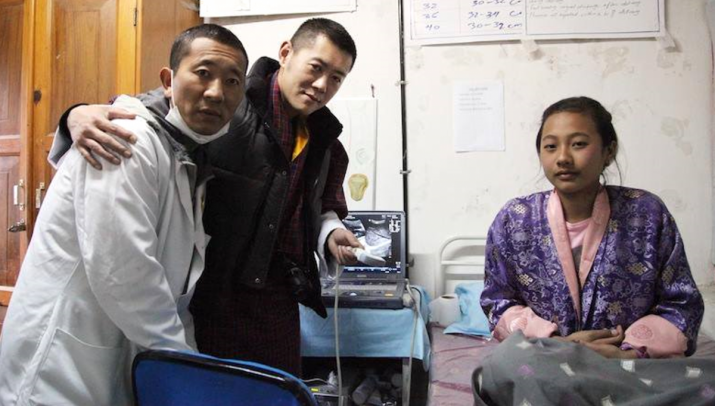NEWS
Bhutan’s Prime Minister Wins Praise and Social Media Fame for Continuing to Practice Medicine
 Bhutanese prime minister Lotay Tshering, left, has continued to treat patients since taking office. From mothership.sg
Bhutanese prime minister Lotay Tshering, left, has continued to treat patients since taking office. From mothership.sgDespite recently taking office as the new prime minister of Bhutan, 51-year-old Lotay Tshering, president of Druk Nyamrup Tshogpa (the Bhutan United Party), has found a measure of social media fame as he still finds time to put his medical training to good use, attending surgery and seeing patients on Saturday mornings and undertaking academic rounds with trainee medical staff and new doctors every Thursday morning.
Tshering, a trained urologist, was sworn in as prime minister of the Himalayan kingdom in November last year, but his reluctance to completely give up treating patients has seen pictures of him at Jigme Dorji Wangchuck National Referral Hospital (JDWNRH) in the capital Thimphu shared widely on social media to an enthusiastic reception among Bhutanese Facebook users.
“I won't leave my practice for anything. All that I am today is because of that, even becoming a prime minister. Therefore, even today I see patients and conduct surgeries every Thursday and Saturday morning,” Tshering is quoted as saying on Facebook. “I was not born a doctor, but I will die as one.”
Born in 1968, Tshering graduated with an MBBS degree from Mymensingh Medical College under Dhaka University in Bangladesh in 2001. He studied urology at the Medical College of Wisconsin in 2007, becoming the only practicing trained urologist in Bhutan. Tshering obtained a fellowship in endourology at Singapore General Hospital, and Okayama University, Japan in 201, and in 2014 he received an MBA from the University of Canberra, Australia.
Sandwiched between economic heavy-hitters China and India on the edge of the mighty Himalayan mountain range, the tiny Buddhist Kingdom of Bhutan is perhaps best known for prioritizing “Gross National Happiness” over the shortsighted acquisitiveness of development based solely on economic growth, and for its sustainable approach to environmental stewardship.
The philosophy of GNH was introduced in the late 1970s by the country’s fourth king, Jigme Singye Wangchuk, drawing inspiration from the kingdom’s traditional Buddhist culture. An alternative to traditional metrics for measuring national development, such as gross national product (GNP) or gross domestic product (GDP), GNH is founded on four underlying principles or “pillars:” good governance, sustainable socio-economic development, the preservation and promotion of culture, and environmental conservation.
Prioritizing Gross National Happiness also extends to healthcare, with affordable and accessible medical treatment central to the nation’s public policy. The country’s constitution notes that: “The state shall provide free access to basic public health services in both modern and traditional medicines.” Healthcare infrastructure and services are developed through five-year plans by the Ministry of Health, which has provided universal healthcare since the 1970s.
The kingdom is also unique in being the world’s only remaining Vajrayana Buddhist nation. The spiritual tradition is embedded in the very consciousness and culture of this remote land, where it has flourished with an unbroken history that dates back to its introduction from Tibet in the eighth century by the Indian Buddhist master Padmasambhava, also known as Guru Rinpoche.
Most Bhutanese—about 75 per cent of the population of some 735,000 people—identify as Buddhists, according to data for 2010 from the Washington, DC-based Pew Research Center, with Hinduism accounting for the majority of the remainder. Most of Bhutan’s Buddhists follow either the Drukpa Kagyu or the Nyingma school of Vajrayana Buddhism.
See more
Bhutan PM spends his Saturday mornings treating patients & performing surgeries (Mothership)
Bhutan PM works both as PM and doctor for citizens (Northeast Now)
Bhutan’s doctor prime minister Lotay Tshering does surgeries on Saturdays if he has no other work (One India)
The Constitution of the Kingdom of Bhutan
Related news from Buddhistdoor Global
Former Conjoined Twins Return to New Life in Bhutan After Life-saving Surgery in Australia
BBC Names Dr. Tashi Zangmo of the Bhutan Nuns Foundation among 100 Most Influential Women of 2018
Bhutan, the World’s Only Carbon-negative Nation, Sets an Example of Environmental Stewardship for a Planet Grappling with Climate Change
Prime Minister of Bhutan Offers Keynote Speech at UN Vesak Celebration in Thailand
Bhutan Nuns Foundation Poised to Launch New Training Center for Female Monastics with First Resident Nuns
Related features from Buddhistdoor Global
My Story: Walking the Path of a Female Monastic in Bhutan
Changing Mindsets: Tashi Zangmo and the Bhutan Nuns Foundation
Happiness Before Profit: Bhutan Seeks to Redefine Business Using Buddhist Values
A Manifestation of Profound Wisdom and Compassion—Remembering Dilgo Khyentse Rinpoche
An Agent of Change: Empowering Bhutanese Nun














